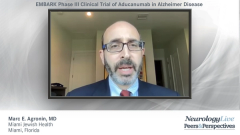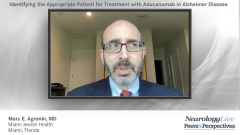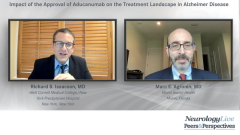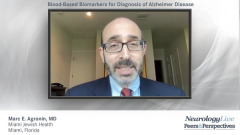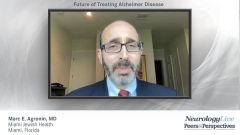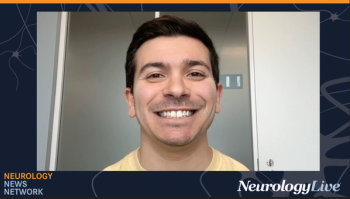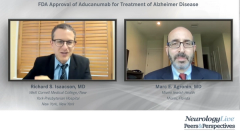
Blood-Based Biomarkers for Diagnosis of Alzheimer Disease
The use of blood-based biomarkers for diagnosis of Alzheimer disease in the context of the comprehensive diagnosis.
Episodes in this series

Richard S. Isaacson, MD: I just wanted to wrap up on a couple of things. First, blood-based biomarkers. Where's our field going? I think and I hope that our field is going towards blood-based biomarkers, PET [positron emission tomography] scans, expensive and cumbersome radiation. Then we have spinal taps. I like spinal taps to get amyloid and tau. It's reliable. I've been used to it. Patients don't want spinal taps, it's cumbersome, takes a lot of time. Serum biomarkers, the first commercially available amyloid blood biomarker test is available now, I think in most states but not every state. Tau test, P-tau217, for example, are really interesting and compelling data as a biomarker. Whether or not these are used for 1-time diagnostic slices to predict or correlate with positivity of an amyloid or tau scan and that is used for it helping with diagnosis or stratifying with who should get a PET scan or whatever else, or whether it's used to maybe track people over time and wouldn't it be great to have it just like we do HDL [high-density lipoproteins] cholesterol, and LDL [low-density lipoproteins], and total cholesterol in a year and a half, 2 years we’re going to be every 6 months getting amyloid and tau. Also, maybe monitoring trajectory that way? “Oh, they have amyloid but no tau. Oh, maybe they're really early, maybe we need to intervene with the anti-amyloid drug.”
These are all hypothetical things. They sound good, they sound exciting, I'd love to track my patient’s amyloid every 6 months over time, and I want to do that and maybe even plan on doing it, but how realistic is this? When are serum biomarkers, even though they're available, they're going to be available more, how much do we know, and don't know, and what can we expect about serum biomarkers?
Marc E. Agronin, MD: There's a lot of work that needs to be done here. We need to be very cautious that we're not basing diagnoses on these results. There's no question within the next 5 years that we will have relatively accurate ways through just a blood test to detect the presence of amyloid and tau. The question again, is what does that really mean? Does that mean they have Alzheimer's disease? What about someone who has tau but not amyloid or vice versa? Or what about as we're seeing clinical trials where you have a positive tau blood test and you have a negative tau scan? We know this is a heterogeneous disorder, there's different subtypes, depending on where you have deposition in the brain is going to determine to some extent the course for some individuals.
You can have Alzheimer's disease, at the same time if you have Lewy bodies in the brain. The complexity here is great, and the more you reduce it to single tests, to some extent, you really risk going down the wrong course. I give this example, no one will go to a doctor on a single blood test want them to say, "Yes, you have this cancer or no, you don't". There are other clinical correlates that you have to mix in with this. As the severity of the diagnosis is a life-changing diagnosis, these tests are not like getting to check your cholesterol level or indicating you're a little anemic or not. This is a life-changing diagnosis, and so we owe our patients, their families and loved ones, and we ourselves as clinicians to be careful, cautious, and to be comprehensive. That's the strength of memory disorder centers of the center you have where we put the whole puzzle together. We're not looking at 1 single data point but everything in aggregate and trying to assign something. I would hope that this is going to continue to be the approach and that requires a lot of education and specialists as well.
Richard Isaacson, MD: I'm really glad you said that. I just want to repeat that for a second, because I get excited about things. I like thinking about the future. I like figuring, “OK, where are we going to be in 5 or 10 years?’ I'm going to try to do that now or yesterday, right? I can't wait till the amyloid blood test come out, but I just want to reiterate what you said. Currently, in medicine, we've come pretty far in certain areas and we would never make a diagnosis of cancer, almost never basically on 1 test, right?
We confirm it, we get corollary, we do that, we repeat it we, so I completely agree. I'm excited about the promise of blood-based biomarkers but we have to be careful. It has to be in the right clinical picture, progressive short-term memory loss, family history of Alzheimer's, to e4 variants. Then the amyloid test in the blood is sky-high. It's probably Alzheimer's disease but I completely agree with you. The panel of tests, the other additional markers, and confirmatory tests, especially if someone's going to be going in a clinical trial, I think it's really important.
Richard Isaacson, MD: Dr Agronin, thanks so much.
Marc E. Agronin, MD: Thank you. My pleasure.
Transcript Edited for Clarity
Newsletter
Keep your finger on the pulse of neurology—subscribe to NeurologyLive for expert interviews, new data, and breakthrough treatment updates.

